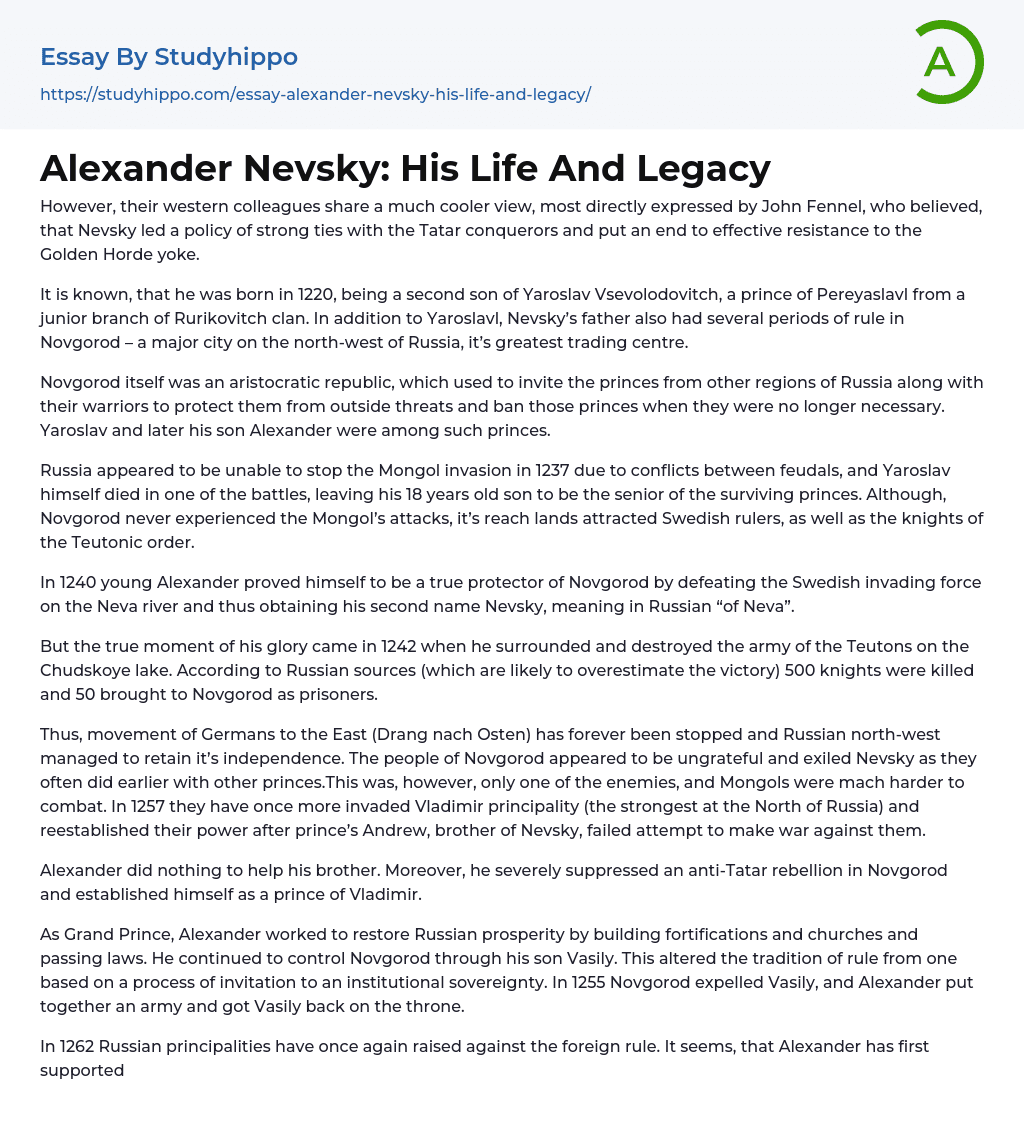Even though there are different opinions, John Fennel, a Western scholar, has a negative view. He argues that Nevsky actively tried to form alliances with the Tatar conquerors, which ultimately prevented any effective resistance against the oppression of the Golden Horde.
In 1220, he was born as the second son of Yaroslav Vsevolodovitch, a prince of Pereyaslavl from a junior branch of Rurikovitch clan. Nevsky's father also ruled in Novgorod, a major trading center in the north-west of Russia, in addition to Yaroslavl.
Novgorod, an aristocratic republic, invited princes from other regions of Russia and their warriors for protection against external threats. Princes were banned when they were no longer needed. Yaroslav and his son Alexander were among these princes.
Conflict between feudals in Russia in 1237 made it di
...fficult to defend against the Mongol invasion, resulting in the death of Yaroslav in one of the battles. This left his 18-year-old son as the senior prince among those who survived. Meanwhile, Novgorod, though unaffected by the Mongol attacks, became a target for Swedish rulers and Teutonic knights due to its extensive territories.
In 1240, Alexander exhibited his true loyalty to Novgorod by triumphing over the Swedish invaders on the Neva river, earning him the name Nevsky, which signifies "of Neva" in Russian.
However, in 1242, the true moment of his glory arrived when he successfully encircled and annihilated the Teutons' army on the Chudskoye lake. According to Russian sources, which might possibly exaggerate the triumph, a total of 500 knights lost their lives, while 50 were captured and taken as prisoners to Novgorod.
The movement of German
to the East, also known as Drang nach Osten, has been stopped permanently. This allowed for the Russian northwest region to maintain its independence. The people of Novgorod were ungrateful and expelled Nevsky just like they had done with previous princes. However, the Mongols posed a much more difficult challenge. In 1257, they invaded the Vladimir principality once again, which was the strongest in Northern Russia. They regained control after Prince Andrew, who is Nevsky's brother, failed in his attempt to fight against them.
Alexander neglected his brother and quashed a rebellion in Novgorod, exerting his authority as a prince of Vladimir.
During his rule as Grand Prince, Alexander focused on rebuilding Russia through constructing fortifications and churches, as well as implementing new laws. He maintained control over Novgorod through his son Vasily, changing the traditional process of rule from one based on invitation to one of institutional sovereignty. However, in 1255, Novgorod expelled Vasily, prompting Alexander to assemble an army and restore Vasily to the throne.
In 1262, Russian principalities revolted against foreign rule. At first, it appeared that Alexander supported the rebellion. However, he later went to the Horde to plead with Berke-khan not to invade Russia, promising to personally punish the rebels.
The Khan, possibly concerned about the tense political situation in the Golden Horde, agreed. However, Alexander died while returning, and there are theories suggesting that he may have been poisoned by the Tatars to eliminate a potential threat to their authority in Russia.
The iconographic representations alone do not suffice to define the life of Alexander Nevsky. He was a formidable warrior and merciless leader,
embodying the values of his time by prioritizing personal interests over the welfare of his subjects.
In order to secure a future for his successors, he had a simple choice: either fight and perish or submit and survive. He mercilessly defeated Russia's adversaries whenever possible, relying heavily on the support of the Mongols.
References
- Isoaho, Mari. The Image of Aleksandr Nevskiy in Medieval Russia: Warrior and Saint (The Northern World; 21). Leiden: Brill Academic Publishers, 2006
- Alexander Nevsky, Saint. (2006). In Encyclop?dia Britannica. Retrieved December 8, 2006, from Encyclop?dia Britannica Online: http://www.britannica.com/eb/article-234
- Vladimir Lenin essays
- Bank essays
- Banking essays
- Corporate Finance essays
- Credit Card essays
- Currency essays
- Debt essays
- Donation essays
- Enron Scandal essays
- Equity essays
- Financial Accounting essays
- Financial Crisis essays
- Financial News essays
- Financial Ratios essays
- Financial Services essays
- Forecasting essays
- Foreign Exchange Market essays
- Free Market essays
- Gold essays
- Investment essays
- Legacy essays
- Loan essays
- Market Segmentation essays
- Money essays
- Personal finance essays
- Purchasing essays
- Retirement essays
- Shareholder essays
- Stock Market essays
- Supply And Demand essays
- Venture Capital essays
- Athens essays
- Belgium essays
- Berlin essays
- British essays
- England essays
- Germany essays
- Great britain essays
- Greece essays
- Ireland essays
- Italy essays
- London essays
- Paris essays
- Pompeii essays
- Rome essays
- Russia essays
- Spain essays
- United Kingdom essays
- 1920S essays
- 1950S essays




